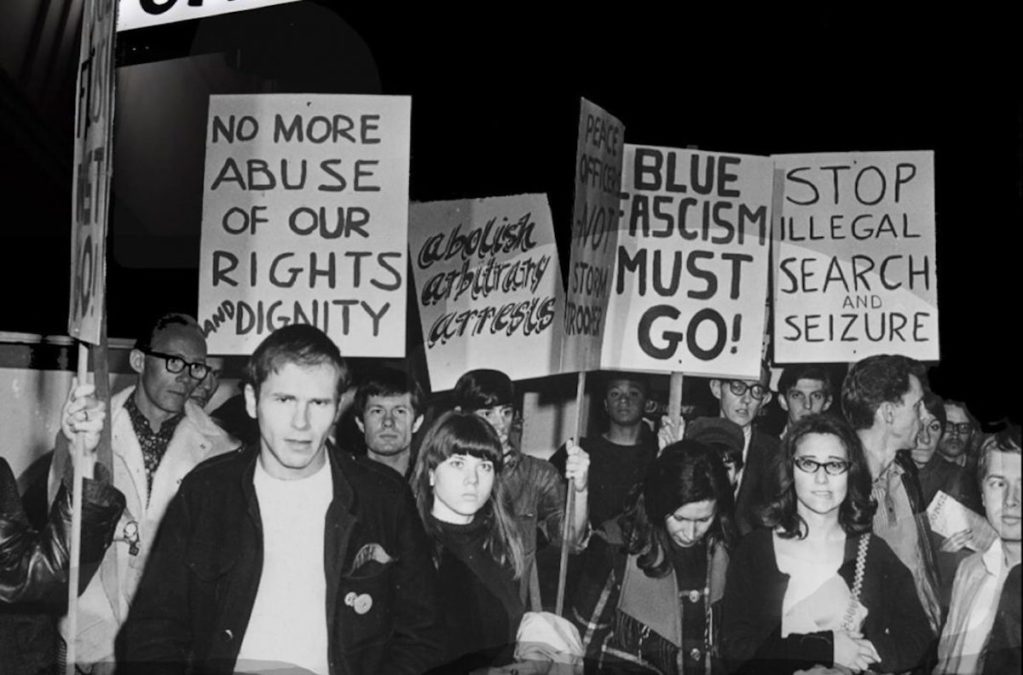Gregorio Davila says it’s time Los Angeles’ pivotal role in LGBTQ liberation comes out of the closet.
While New York City and Stonewall get an overwhelming amount of credit for launching the fight for LGBTQ liberation, the City of Angels is home to numerous events and influencers that predate Stonewall and helped set the stage for the uprising in 1969.
Davila examines the story in the documentary “LA A Queer History,” which screens Saturday at the Highland Park Independent Film Festival.

Demonstrators protest outside The Black Cat bar in Silver Lake approximately six weeks after Los Angeles police officers conducted a violent raid at the venue on Jan. 31, 1966. Photo: “LA A Queer History”
In his film, director Davila explores the rich history of L.A.’s queer liberation movement from the early 20th century to today. He uses archival footage from decades of demonstrations, interviews with activists who were on the frontlines, and narration from stars including Rosario Dawson and Steve Buscemi.
Particular attention is focused on police brutality of the LGBTQ community. For decades, police used sting operations and violent raids at bars and clubs as a weapon to terrorize the community and try to keep them in the closet.
Here, Davila shares five things you didn’t know about Los Angeles’ LGBTQ history.
Dorothy Arzner was groundbreaking film director who broke glass ceiling
Early Hollywood
“Gays and lesbians created the glamour and the artistry of Hollywood,” Davila says. “Dorothy Arzner was the only female to make movies in the early days. She was a butch lesbian, very open, and had a partner.
“Adrian was the main costume designer for MGM. He was a big gown designer, and was the costume designer for ‘The Wizard of Oz’.”
Mattachine Society
Founded in 1950, “the Mattachine Society was the first gay rights organization,” Davila says. “They used the word homophile to refer to themselves because the word homosexual had so much negative connotations. The church demonized homosexuals. The police arrested homosexuals.
“Also, Harry Hay wanted to use it especially when they were in court defending themselves from being arrested at a gay bar,” Davila says. “He would say, We are homophiles. We are not homosexuals. The judge would ask, What does that mean, and then they would define who they were in terms that they could decide.”
ONE Magazine
ONE Magazine was the first widely circulated publication for gay people in the United States. It was first published in January 1953.
The Magazine was distributed throughout the U.S. and abroad, giving voice to early LGBT activism, then termed the homophile movement. It was daring and confrontational, tackling provocative issues, such as employment discrimination, police harassment and gay marriage.
Black Cat protest
“The Black Cat protest was the first organized protest against police brutality,” Davila says. “Gay people came out into the open initially to say, I’m not afraid, and I’m not ashamed. We’re sick of the terror from the police.”
The protest took place Feb. 11, 1967, in response to the Los Angeles Police Department’s brutal raid on Jan. 31, 1966. In all, 14 people were arrested. Six of them were booked and eventually charged with lewd conduct because they were kissing. The lewd conduct counts were eventually dropped.
About 200 people attended the nonviolent protest.
“The protest doesn’t get the notoriety it deserves,” Davila says.
First Pride parade
“New York organizers contacted people in major cities around the county and wanted everyone to have demonstrations in solidarity with the one year anniversary of Stonewall,” Davila says. “In Los Angeles, Troy Perry came up with the idea of having a parade. He said, We’re Hollywood. The home of entertainment. We do things differently here. Let’s have a parade.
“While everyone had a demonstration, we had a parade down Hollywood Boulevard, but it was a battle to get the permit,” Davila says. “L.A. Police Chief Ed Davis didn’t want to give gay people a permit to have a parade. The ACLU got involved and won in court.”
